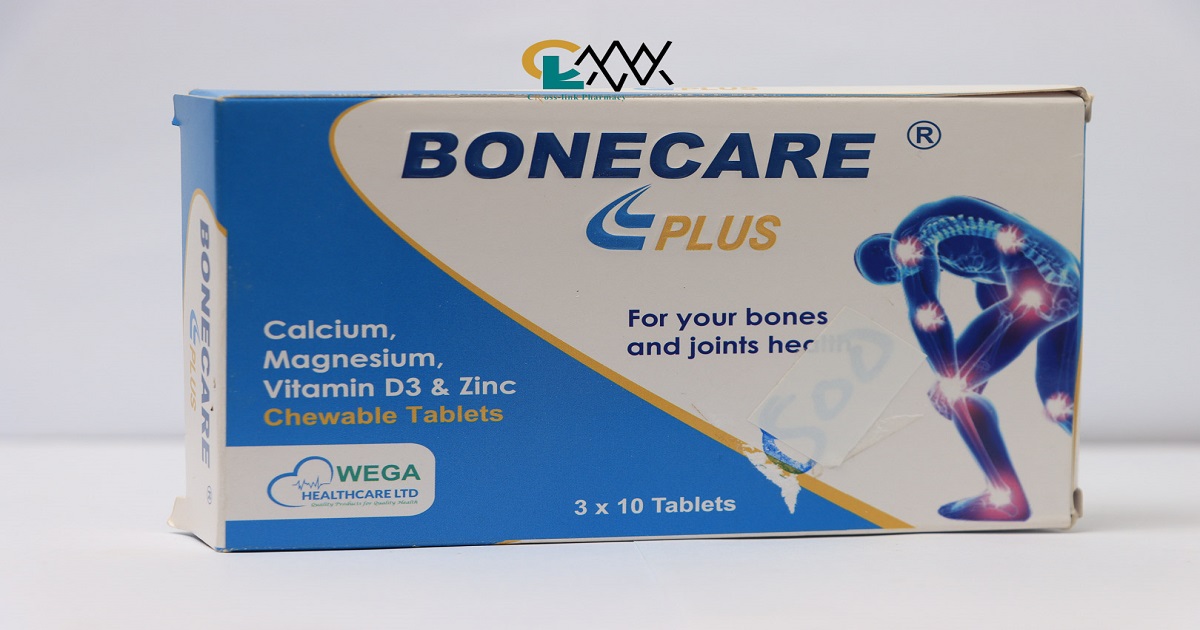Table of Contents
ToggleIntroduction
Understanding Bone Health
Our bones are the framework of our body, providing structural support, protecting vital organs, and facilitating movement.Bone care tablets play a vital role in maintaining optimal bone health, ensuring that our skeletal system remains strong and resilient. Incorporating these supplements into our daily routine can help fortify our bones, reducing the risk of fractures and promoting overall well-being and longevity.
Importance of Bone Care
As we age, our bones undergo constant remodeling, with old bone tissue being replaced by new. However, various factors such as diet, lifestyle choices, and medical conditions can impact this process, leading to weakened bones and increased susceptibility to fractures and diseases like osteoporosis.
Factors Affecting Bone Health
Diet and Nutrition
A balanced diet rich in essential nutrients is vital for bone health. Calcium and vitamin D are particularly important, as they play key roles in bone formation and maintenance.
Calcium and Vitamin D
Calcium is a mineral that is essential for building and maintaining strong bones. Good dietary sources of calcium include dairy products, leafy greens, and fortified foods. Vitamin D, meanwhile, helps the body absorb calcium and is synthesized by the skin through exposure to sunlight.
Other Essential Nutrients
In addition to calcium and vitamin D, other nutrients such as magnesium, phosphorus, and vitamin K are also important for bone health. These nutrients can be obtained from a variety of foods, including nuts, seeds, whole grains, and fruits.
Lifestyle Choices
Certain lifestyle factors can impact bone health. Regular physical activity, particularly weight-bearing exercises like walking, jogging, and resistance training, can help strengthen bones and reduce the risk of fractures.
Exercise and Physical Activity
Exercise stimulates bone growth and helps maintain bone density. Incorporating a variety of activities into your routine, including aerobic exercises, strength training, and flexibility exercises, can provide comprehensive benefits for bone health.
Smoking and Alcohol Consumption
Smoking and excessive alcohol consumption have been linked to decreased bone density and an increased risk of fractures. Quitting smoking and limiting alcohol intake can help protect bone health.
Medical Conditions
Several medical conditions can affect bone health, including osteoporosis, rheumatoid arthritis, and hormonal imbalances. These conditions can weaken bones and increase the risk of fractures if left untreated.
Osteoporosis
Osteoporosis is a condition characterized by low bone density and increased bone fragility. It often goes unnoticed until a fracture occurs, making prevention and early detection crucial.
Rheumatoid Arthritis
Rheumatoid arthritis is an autoimmune disorder that causes inflammation of the joints. Chronic inflammation can lead to bone loss and joint damage over time, highlighting the importance of managing the condition effectively.
Hormonal Imbalances
Hormonal imbalances, such as those associated with menopause or thyroid disorders, can affect bone health. Hormone replacement therapy may be recommended to help maintain bone density and reduce fracture risk.
The Role of Bone Care Tablets
Supplements for Bone Health
In addition to obtaining nutrients from food sources, supplements can be beneficial for individuals who may have difficulty meeting their daily requirements through diet alone.
Calcium Supplements
Calcium supplements are available in various forms, including calcium carbonate and calcium citrate. They can help ensure adequate intake of this essential mineral, particularly for individuals with lactose intolerance or other dietary restrictions.
Vitamin D Supplements
Many people have insufficient levels of vitamin D, especially those who live in regions with limited sunlight exposure or have darker skin. Vitamin D supplements can help maintain optimal levels and support calcium absorption.
Magnesium Supplements
Magnesium plays a crucial role in bone health, as it helps regulate calcium metabolism and bone formation. Supplementing with magnesium may be beneficial for individuals with inadequate dietary intake or absorption issues.
Prescription Medications
In some cases, prescription medications may be necessary to treat or prevent bone-related conditions such as osteoporosis.
Bisphosphonates
Bisphosphonates are a class of drugs commonly used to treat osteoporosis by inhibiting bone resorption. They help increase bone density and reduce fracture risk in individuals with low bone mass.
Hormone Replacement Therapy
Hormone replacement therapy, particularly estrogen therapy for postmenopausal women, can help maintain bone density and reduce the risk of fractures. However, it’s essential to weigh the potential benefits and risks with a healthcare provider.
Calcitonin
Calcitonin is a hormone that helps regulate calcium levels in the body. It can be prescribed to treat osteoporosis and other conditions associated with excessive bone resorption.
Choosing the Right Bone Care Tablet
Consulting with Healthcare Professionals
Before starting any supplementation regimen, it’s essential to consult with a healthcare professional, such as a doctor or nutritionist, to determine the most appropriate approach for your individual needs.
Doctor’s Recommendations
Your doctor can assess your overall health and recommend specific supplements or medications based on factors such as age, gender, medical history, and lifestyle habits.
Nutritionist’s Advice
A nutritionist or dietitian can provide personalized guidance on dietary strategies to support bone health, as well as recommendations for supplements if necessary.
Understanding Your Specific Needs
Not all bone care tablets are created equal, and it’s essential to choose products that address your specific needs and preferences.
Age and Gender
Certain age groups and genders may have higher nutrient requirements or be at greater risk for bone-related conditions. Tailoring your supplement regimen to your demographic characteristics can help optimize results.
Existing Medical Conditions
Individuals with pre-existing medical conditions may require specialized formulations or dosages of bone care tablets. It’s important to discuss any health concerns or medications with your healthcare provider before starting a new supplement.
Lifestyle Factors
Your lifestyle habits, such as diet, exercise routine, and exposure to environmental factors, can impact your bone health and influence the effectiveness of bone care tablets. Making healthy choices and adopting bone-friendly habits can complement supplementation efforts.
How to Take Bone Care Tablets
Dosage and Timing
To maximize the benefits of bone care tablets, it’s important to follow recommended dosage guidelines and instructions for use.
Daily Requirements
Calcium and vitamin D requirements vary depending on factors such as age, gender, and individual health status. Your healthcare provider can help determine the appropriate dosage for you.
Frequency of Intake
Some bone care tablets may need to be taken once daily, while others may require multiple doses throughout the day to maintain steady blood levels of nutrients. Consistency is key to achieving optimal results.
Potential Side Effects
While bone care tablets are generally safe when taken as directed, they may cause side effects in some individuals.
Gastrointestinal Upset
Common side effects of calcium supplements include constipation, bloating, and abdominal discomfort. Taking supplements with food or choosing a different formulation can help minimize these effects.
Interactions with Other Medications
Certain medications, such as corticosteroids and antacids, can interfere with the absorption or metabolism of bone care tablets. It’s important to inform your healthcare provider of all medications you are taking to avoid potential interactions.
Allergic Reactions
Some individuals may be allergic to ingredients commonly found in bone care tablets, such as lactose or soy. If you experience symptoms of an allergic reaction, such as rash, itching, or difficulty breathing, seek medical attention immediately.
Tips for Enhancing Bone Health
In addition to taking bone care tablets, there are several lifestyle strategies you can implement to support overall bone health and reduce the risk of fractures and bone-related conditions.
Adopting a Balanced Diet
A diet rich in calcium, vitamin D, and other essential nutrients is essential for maintaining optimal bone health. Incorporate a variety of foods into your meals to ensure you’re getting a diverse range of nutrients. Some calcium-rich foods include dairy products like milk, cheese, and yogurt, as well as leafy greens such as kale, broccoli, and bok choy. Vitamin D sources include fatty fish like salmon and mackerel, egg yolks, and fortified foods like cereals and orange juice.
Incorporating Calcium-Rich Foods
Make an effort to include calcium-rich foods in your daily diet. Try adding yogurt to your breakfast, enjoying a spinach salad for lunch, or incorporating canned sardines into pasta dishes for dinner. Snack on almonds or figs for a calcium boost throughout the day.
Including Vitamin D Sources
Expose yourself to sunlight for short periods each day to stimulate vitamin D production in your skin. During the winter months or if you live in a region with limited sunlight, consider taking a vitamin D supplement to maintain adequate levels. Additionally, include vitamin D-rich foods like salmon, tuna, and fortified dairy products in your diet.
Regular Exercise Routine
Engage in weight-bearing exercises regularly to promote bone strength and density. Weight-bearing exercises include activities where your body works against gravity, such as walking, jogging, dancing, and climbing stairs. Aim for at least 30 minutes of moderate-intensity exercise most days of the week.
Weight-Bearing Exercises
Incorporate weight-bearing exercises into your fitness routine to build and maintain bone density. Activities like brisk walking, jogging, hiking, and dancing are all excellent choices. Consider joining a fitness class or group to stay motivated and accountable.
Strength Training
Include strength training exercises in your workouts to further enhance bone health. Lift weights, use resistance bands, or perform bodyweight exercises like squats, lunges, and push-ups. Focus on major muscle groups such as legs, hips, back, chest, shoulders, and arms.
Avoiding Risky Habits
Certain habits can negatively impact bone health and increase the risk of fractures and bone-related conditions. Take steps to minimize or eliminate these habits from your lifestyle.
Limiting Alcohol Consumption
Excessive alcohol consumption can interfere with calcium absorption and increase the risk of bone loss. Limit your intake to moderate levels, which is defined as up to one drink per day for women and up to two drinks per day for men.
Quitting Smoking
Smoking is associated with decreased bone density and an increased risk of fractures. Quitting smoking can help improve bone health and overall well-being. Seek support from healthcare professionals, support groups, or smoking cessation programs to quit successfully.
By incorporating these tips into your daily routine, you can support optimal bone health and reduce the risk of fractures and bone-related conditions. Remember to consult with your healthcare provider before starting any new supplement or exercise regimen, especially if you have existing medical conditions or concerns.
Conclusion
Taking care of your bones is essential for maintaining mobility, independence, and overall quality of life. Bone care tablets can be valuable supplements to support bone health, especially for individuals at risk of deficiencies or bone-related conditions. However, they should be used in conjunction with a balanced diet, regular exercise, and other healthy lifestyle habits for optimal results.




















